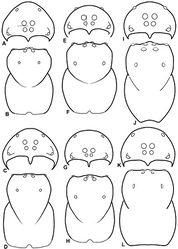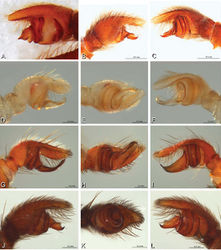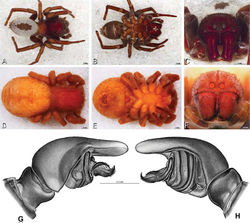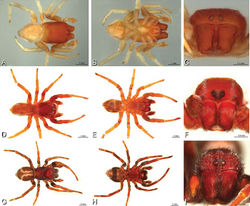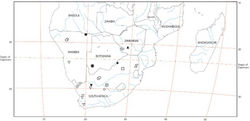Paradonea presleyi
| Notice: | This page is derived from the original publication listed below, whose author(s) should always be credited. Further contributors may edit and improve the content of this page and, consequently, need to be credited as well (see page history). Any assessment of factual correctness requires a careful review of the original article as well as of subsequent contributions.
If you are uncertain whether your planned contribution is correct or not, we suggest that you use the associated discussion page instead of editing the page directly. This page should be cited as follows (rationale):
Citation formats to copy and paste
BibTeX: @article{Miller2012ZooKeys195, RIS/ Endnote: TY - JOUR Wikipedia/ Citizendium: <ref name="Miller2012ZooKeys195">{{Citation See also the citation download page at the journal. |
Ordo: Araneae
Familia: Eresidae
Genus: Paradonea
Name
Paradonea presleyi Miller, Griswold, Scharff, Řezáč, Szűts & Marhabaie sp. n. – Wikispecies link – ZooBank link – Pensoft Profile
Types
Holotype male from Falcon College, Zimbabwe, 20°18'S, 29°E, 10 November 1990 (V. & B. Roth, CASENT 9039236, deposited in CAS); paratype male from Kruger National Park, South Africa, 29 November 2005, pit traps PCZ (K. Harris, AcAT 2008/4480, deposited in NCA).
Etymology
A patronymic in honor of Elvis Aaron Presley, king of rock and roll and subject of innumerable black velvet paintings.
Diagnosis
. Distinguished from other eresids except Stegodyphus by the median eye group, which has large, subequal eyes (AME/PME > 0.6) with clear separation on the horizontal axis and significant overlap on the vertical axis (Fig. 70I); distinguished from Stegodyphus by the short, slightly obtuse clypeal hood (long and acute in Stegodyphus, Fig. 11A, E, I). Male distinguished from other eresids by the distinctive dorsal abdominal pattern (Fig. 70G). Further distinguished from other eresids except Paradonea variegata by the conductor, which bears a helical ridge fringed with distinct papillae (Fig. 14J, L); distinguished from Paradonea variegata by the contiguous chelicerae (Fig. 70I; mesally excavated in Paradonea variegata, Fig. 69C), by the median eye group, which has significant overlap on the vertical axis (Fig. 70I; slight overlap in Paradonea variegata, Fig. 69C), and by the proportions of the conductor, which are wider and shorter than in Paradonea variegata (Fig. 14J, L; compare with 14B, C).
Description
Male (Kruger National Park, South Africa, AcAT 2008/4480, NCA): Carapace with white setae concentrated in thoracic region and eye region; cephalic region semicircular, wider than long, moderately raised; AME smaller than PME (0.57), median eyes slightly separated on horizontal axis, significant overlap on vertical axis, ALE tubercles absent, PER width narrower than AER width (0.87), PLE position on carapace 0.29; clypeal hood forms a slightly more than 90° angle; fovea shallow. Chelicerae contiguous mesally, with lateral boss. Legs with patches and longitudinal bands of white setae; femur I slightly thickened with thick brush of dark setae; with row of distal ventral macrosetae on metatarsus I–IV, a few scattered ventral macrosetae on tarsus I–IV and metatarsus II–IV. Dorsum of abdomen with two longitudinal stripes of white hairs more or less parallel anteriorly, diverging posteriorly, then connected by transverse portion, median part medium brown, ectal and posterior part dark brown (Fig. 70G–I).
Male palp with proximal-distal axis; tegulum subrectangular; conductor and embolus together form apical complex running more or less distally; conductor moderately sclerotized, broad with helical ridge fringed with distinct papillae, hooked distally; tegular division slightly longer than embolic division; cymbium with several prolateral macrosetae (Fig. 14J–L).
Female: Unknown.
Original Description
- Miller, J; Griswold, C; Scharff, N; Řezáč, M; Szűts, T; Marhabaie, M; 2012: The velvet spiders: an atlas of the Eresidae (Arachnida, Araneae) ZooKeys, 195: 1-144. doi
Images
|
